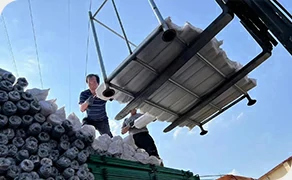 TEL:
+86-13102802206
TEL:
+86-13102802206
 Email:
fencenetting@china.com
Email:
fencenetting@china.com
 Language
Language
 TEL:
+86-13102802206
TEL:
+86-13102802206
 Email:
fencenetting@china.com
Email:
fencenetting@china.com
 Language
Language


The Versatile Applications of Stainless Steel Wire Cable
Stainless steel wire cable has become an essential material in various industries, thanks to its excellent strength, durability, and resistance to corrosion. This versatile product is fashioned from stainless steel, making it suitable for numerous applications, ranging from construction to marine environments. Understanding the characteristics and advantages of stainless steel wire cable can help businesses and consumers make informed decisions about its use.
Properties of Stainless Steel Wire Cable
The primary benefit of stainless steel wire cable is its corrosion resistance. Unlike traditional steel cables, which can degrade when exposed to moisture and chemicals, stainless steel cables retain their integrity in harsh environments. This makes them ideal for marine applications, where salty air and seawater can wreak havoc on most materials. The combination of chromium and nickel in stainless steel not only enhances its strength but also forms a protective layer that improves its resistance to rust and oxidation.
Additionally, stainless steel wire cable is known for its impressive tensile strength. This property ensures that it can withstand heavy loads without breaking or deforming, making it a reliable choice for critical applications where safety is paramount. Whether used in lifting and rigging, construction, or infrastructure, stainless steel wire cables provide the necessary strength and reliability.
Applications Across Industries
1. Construction and Architecture Stainless steel wire cables are widely used in construction, particularly in suspension bridges and as part of structural support systems. Their high tensile strength allows for the construction of lighter yet strong structures. Moreover, they can be aesthetic components in architecture, providing stylish cable railings and facades that enhance the visual appeal of buildings.
2. Marine Applications In marine environments, the benefits of stainless steel wire cable are vividly seen. Ropes and cables used in boats, docks, and marine constructions are often made from stainless steel to resist corrosion and withstand the challenges of exposure to water and salt. Their durability ensures a longer lifespan, reducing the frequency of replacement and maintenance.

3. Industrial Usage Industries such as manufacturing and logistics utilize stainless steel wire cable for hoisting and lifting applications. Their robust nature supports heavy machinery and equipment in factories and warehouses, ensuring safe and efficient operations. Furthermore, stainless steel cable is commonly used in conveyor systems to transport products with ease and safety.
4. Medical Field In the medical sector, stainless steel wire cables are employed in various applications, including surgical instruments and internal fixation devices. Their biocompatibility and resistance to corrosion make them suitable for use within the human body, ensuring that critical medical instruments remain safe and effective over time.
Advantages of Stainless Steel Wire Cable
One of the greatest advantages of stainless steel wire cable is its longevity. The initial investment may be higher compared to other materials, but the reduced need for replacement and repair results in cost-effectiveness over time. Additionally, the aesthetic appeal of polished stainless steel adds value in applications where appearance matters, such as architectural designs.
Another significant advantage is its versatility. Stainless steel wire cables can be manufactured in various sizes, configurations, and strengths to meet the specific needs of different applications. This adaptability ensures that engineers and designers can find the perfect solution for their projects.
Conclusion
In summary, stainless steel wire cable is a remarkable material that finds application across a wide range of industries. Its strength, durability, and resistance to corrosion distinguish it as a superior choice for various uses, from construction and marine to industrial settings and medical applications. As industries continue to evolve and demand more reliable materials, the importance of stainless steel wire cable will undoubtedly grow, cementing its place as a cornerstone component in modern engineering and design.